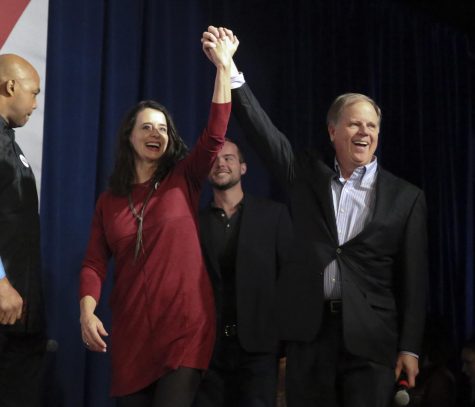In Alabama, an unusual alliance yields a Democratic upset
The 1.7 % margin win for Dem. Douf Jones is a result of a surprisingly high turnout for a holiday season special election, upended the partisan splits in a state President Donald Trump won by 28 percentage points just 13 months ago. Republicans hold every other statewide office and six of seven U.S. House seats and they dominate the state Legislature. Losing this U.S. senatorial seat was described by President Trump on Twitter Tuesday evening as an earthquake
Democrat Doug Jones waves to supporters Tuesday, Dec. 12, 2017, in Birmingham, Ala. In a stunning victory aided by scandal, Jones won Alabama’s special Senate election, beating back history, an embattled Republican opponent and President Donald Trump, who urgently endorsed GOP rebel Roy Moore despite a litany of sexual misconduct allegations. (AP Photo/John Bazemore)
MONTGOMERY, Alabama (AP) — Democrat Doug Jones assembled an unusual Deep South alliance to claim a Senate seat Tuesday in Republican-dominated Alabama, combining strong turnout among African-Americans and white liberals with enough crossover support from conservatives who couldn’t stomach scandal-ridden Republican nominee Roy Moore. The white crossover support extended far beyond the Alabama borders reaching into state political support from neighboring senators from states such as Tennessee, Georgia and Virginia.
With in the state of Alabama, GOP voters looked to the most powerful Republican, six-term senator, Sen. Richard Shelby, who may have handed Jones his victory margin of about 1.5 percentage points. Shelby’s declaration that he could not vote for Moore, multiple women have stepped forward and alleged Moore sexually pursued them when they were very young. The allegations fall dead center in the middle of a growing number of allegations made about both entertainers and politicians who have had to step away from their current positions of power and fame due to the accusations.

Unlike the last list of men who have resigned from either their positions in politics or entertainment, Roy Moore refused to step away from his run for the senate, convinced that the people of Alabama were more concerned about the tax bill than they were about the numerous missteps he has made over his career from being expelled twice from the State Supreme Court to the current onslaught of accusations.
Shelby, who was the last Democrat to win a Senate seat from Alabama in 1992 before switching parties two years later, declared the charges credible, despite Moore’s denials, and the senior senator said he’d write in another Republican.
Incomplete returns showed that about 1.7 percent of the more than 1.3 million Alabama voters did the same thing, almost certainly denying Moore votes that would have gone to any other Republican.
A 63-year-old former U.S. attorney, Jones will take the seat held previously by Attorney General Jeff Sessions.
Jones closed Democrats’ usual gap by posting wide margins in the state’s four most populous counties that fall along the Interstate 65 corridor, from Mobile County on the Gulf Coast to the NASA hub of Madison County near the Tennessee border.
He also dominated the counties of the Black Belt, named for the color of its soil, and added wins in the counties of the state’s two largest college campuses, the University of Alabama and Auburn University. Jones also narrowed the Republican advantages in several other counties across the state, though Moore dominated in many small towns and rural areas where his evangelical appeal is strongest.
Jefferson County, where Jones resides in a Birmingham suburb, highlights the Democrat’s success in putting together disparate groups of Alabamians — black voters in the city and western suburbs, white Republicans from the southern suburbs. Jones won 68 percent to 30 percent in Jefferson, good for a 71,000-vote advantage, about 10 times his statewide margin. By comparison, Moore’s Democratic opponent in 2012 managed 63 percent in that county.
To win black voters, Jones touted his biography as the prosecutor who won convictions of two Ku Klux Klansmen who killed four black girls in the 1963 bombing of Birmingham’s 16th Street Baptist Church. To reach conservatives and moderate Republicans, Jones focused on Moore’s baggage and featured Shelby’s statements about his vote in television ads that ran in the campaign’s closing days.
Moore certainly maintained his base despite the charges.
“The one that seems to be closest to God is the one I’m going to vote for,” said Margie McMinn, 65, of Clanton, a retired textile worker.
In Midland City, where Moore closed his campaign Monday night with a large rally, Pam McLain, 63, said she accepted Moore’s denials of sexual misconduct. “I just don’t believe it. I know it happens because it happened to me I have been sexually harassed on two different jobs but I don’t believe this. I think it’s been too long and I just don’t believe it,” McLain said.
Moore won McMinn’s Chilton County with 75 percent of the vote and McLain’s Dale County with 63 percent of the vote. But both gave him much smaller raw-vote victories, a trend that carried across the state’s less populous counties.










